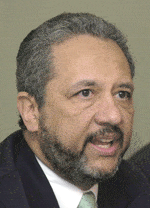Panama

|
Instead, Panamas new minister of economy and finance, Ricaurte Vasquez Moral, brings what any country would want for its top fiscal officer: decades of experience in the private and public sectors, including eight years keeping the financial activities of the Panama Canal running smoothly.
Educated at several top universities in the United States, Vasquez holds a doctorate in administrative economy from Rensselaer Polytechnic Institute in Troy, NY. He was minister of planning and economic policy between 1984 and 1988 and in 1996 became the first Panamanian to direct the Office of Financial Administration of the now-extinct Panama Canal Commission.
In August he left his post as sub-administrator of the Panama Canal Authority to take a job with the new Torrijos administration that assumed power September 1. While sub-administrator at the authority, he developed a 2025 master plan for the modernization of the trans-oceanic route that helps drive Panamas economy.
Financial analysts say one of the first hurdles for Vasquez will be persuading Panamas legislative branch that the Latin nation needs to temporarily suspend its fiscal responsibility law. The law requires the deficit of the non-financial public sector to be maintained at 2% of the GDPbut its edging toward 5%.
But the slippage wasnt unexpected, and analysts say they are encouraged by early statements made by Vasquez and Torrijos.
They said theyre going to rein in the fiscal deficit, reform the social security system and provide more transparency, says Lisa M. Schineller, an analyst with Standard & Poors in New York City. They want to improve their fiscal stance.
The first test of that goal will be the 2005 budgetexpected to be unveiled this month. We have to see if it includes the breadth and depth of reforms that the country needs, Schineller adds.



